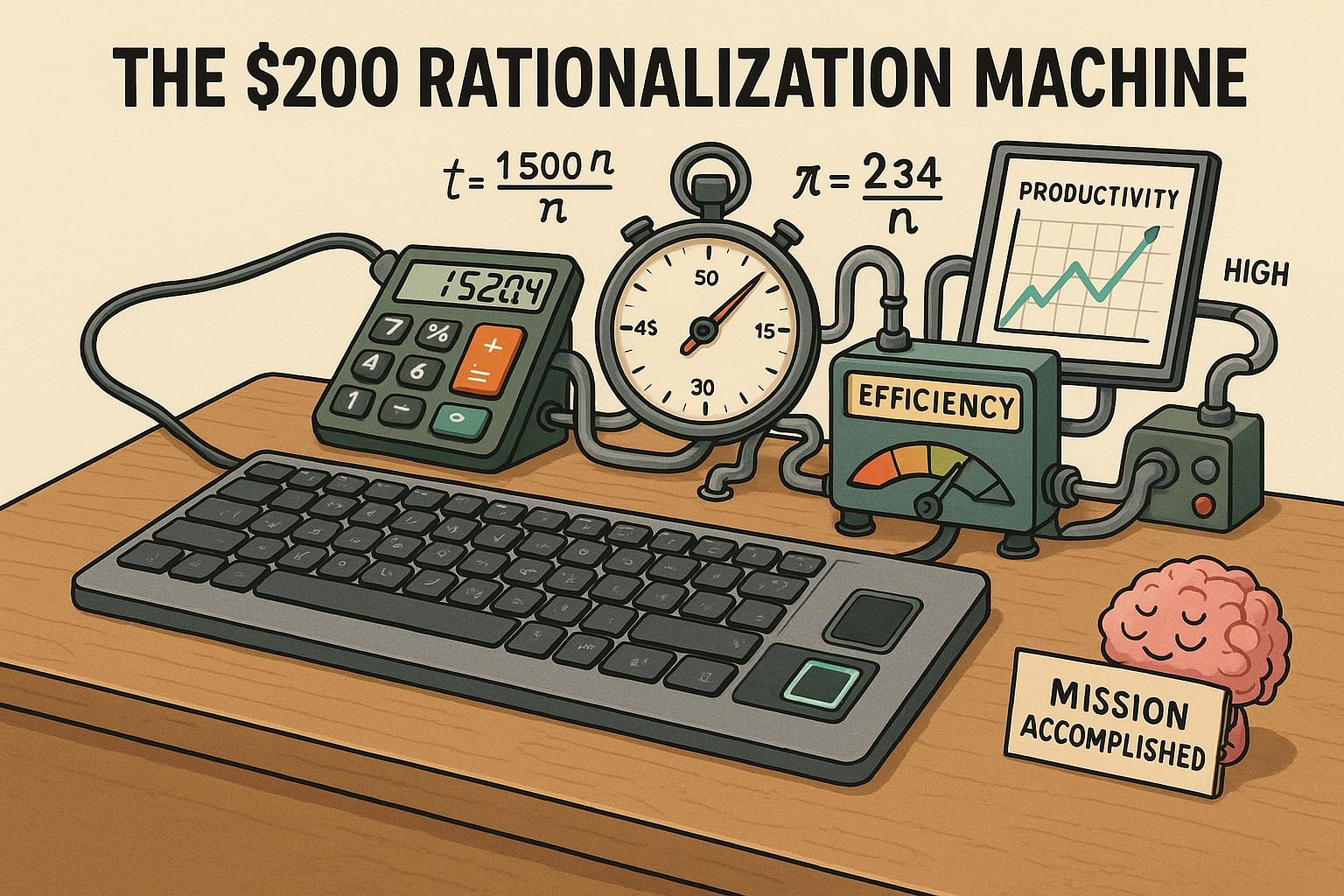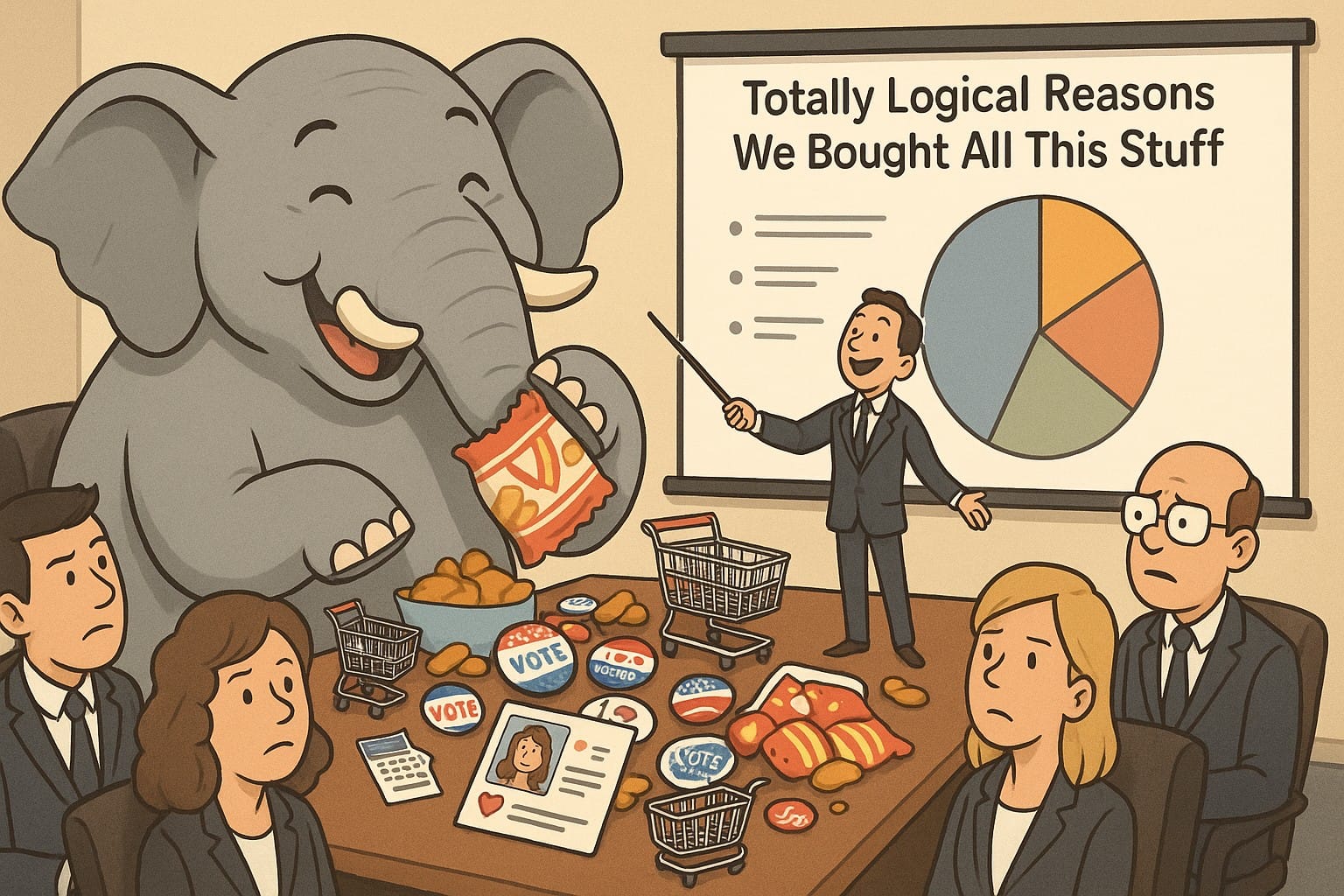The Psychology of Emotional Decisions

You don't make rational decisions and feel good about them. Instead, you make emotional decisions and scramble to explain why they were brilliant. Your brain is basically a very sophisticated PR department for your feelings, spinning every impulse purchase and political hot take into a masterpiece of logical reasoning.
Take my recent $200 keyboard with a fingerprint reader. The rationale: "I calculated the time savings from not typing my password 50 times daily." That's about 2.5 minutes saved daily. At that rate, I'd need to use the keyboard for roughly five years to justify one hour of my allegedly precious time. But my emotional brain had already bought the keyboard the moment I saw the sleek fingerprint sensor. My rational brain was just the cleanup crew, armed with spreadsheets and time-motion studies.
This isn’t a personal failing or a modern affliction. We’re human, and feelings drive, and logic navigates.
The Elephant and the Rider (Or: How Your Feelings Hijacked Your Prefrontal Cortex)
Psychologist Jonathan Haidt illustrated this concept with his elephant-and-rider metaphor. The elephant symbolizes your emotional, intuitive system: strong, quick to respond, and surprisingly intelligent in its own way. The rider represents your conscious reasoning: articulate, analytical, and convinced it's in control.
Plot twist: the elephant goes wherever it wants. The rider's job is to look around afterward and confidently announce, "Yes, this is exactly where I meant to go."
Brain imaging studies reveal this beautifully. When people encounter moral dilemmas, their emotional centres light up within milliseconds. The reasoning areas activate later, like delayed subtitles for a movie you're already watching. We're observing our brains make decisions and then explain them to us in real-time.
This isn't a design flaw. Our ancestors who spent ten minutes logically evaluating whether that rustling bush contained a predator became evolutionary footnotes. Quick emotional responses kept them alive long enough to reproduce. The reasoning mind evolved partly as a social tool, helping us explain our gut reactions in ways that wouldn't get us kicked out of the tribe.
In modern life, the stakes are lower, but the pattern remains. We still decide first and justify later, except now we're explaining why we needed that kitchen gadget or why our political candidate is obviously superior.

Where Your Brain's PR Department Works Overtime
This emotional-first, rationalize-later pattern is common, but some domains offer rich hunting grounds for self-deception.
Shopping: The Theatre of Justified Desire
Consumer behaviour is where rationalization gets a PhD. We don't buy cars because they're shiny and make us feel important. We buy them for "reliability" and "resale value." We don't upgrade our phones for the new camera that makes us feel like professional photographers. We need it for "productivity."
That $7 coffee isn't about the ritual comfort of treating ourselves. It's "fuel for a productive morning." The designer jeans aren't about looking good. They're an "investment in quality that will last longer." The subscription box isn't retail therapy. It's "discovering new products efficiently."
Marketing departments understand this better than we do. They sell us feelings and give us facts to justify the purchase. "Because you're worth it" is the emotional hook. The ingredient list and clinical studies are the rationalization accessories sold separately.
My keyboard purchase fits this pattern. The fingerprint reader wasn't about security or convenience—my password isn't Fort Knox material. It was about feeling like I was living in a sleek, passwordless future where technology bends to my will. The timesaving calculations came later, when I needed to explain to myself (and my budget) why a perfectly functional $50 keyboard wouldn't do.
Politics: Confirmation Bias in a Stadium
Political reasoning might be the most spectacular theatre of motivated cognition. We don't choose political positions based on careful policy analysis and then feel good about them. First, we feel tribal loyalty, then we cherry-pick evidence to support our beliefs.
Studies show that people process political information like lawyers defending a client rather than scientists testing a hypothesis. The same economic data has different interpretations depending on which team you're rooting for. The unemployment rate is either "a lagging indicator that doesn't reflect real economic health" or "clear evidence of successful policy," depending entirely on who's in office.
We treat politics like sports, but with the psychological comfort of pretending it's philosophy. The result is a nation of armchair policy experts with opinions that align perfectly with their tribal affiliations. What are the odds?
Romance: Love Is Blind, But It Has 20/20 Hindsight
Dating apps have beautifully gamified this process. We swipe based on split-second emotional reactions: attraction, intrigue, revulsion. Then we construct elaborate compatibility theories afterward. "We both like hiking" becomes proof of deep compatibility, ignoring that half the population claims to enjoy hiking on their dating profiles.
Long-term relationships follow the same script. We fall for someone because they make us laugh or feel understood or safe, then spend years explaining why they're "perfect for us" based on shared interests, life goals, and astrological compatibility. The heart wants what it wants, but the mind insists on taking credit for the selection process.
Career Choices: Following Your Passion (Backwards)
The "follow your passion" advice gets this completely backward. Most people don't choose careers based on pre-existing passions and then find fulfilment. Instead, they stumble into something, develop competence, experience success and recognition, then decide they're "passionate" about it.
We're remarkably good at becoming passionate about things we're good at. The satisfaction comes from mastery and social recognition, and we reverse-engineer it into a calling narrative. The investment banker discovers their passion for finance. The lawyer realizes they care about justice. The marketing manager was born to understand consumer psychology.
The Recognition Game: Catching Your Brain in the Act
The first step in dealing with this psychological sleight of hand is learning to spot it in real-time. Your rationalization engine leaves distinctive fingerprints.
The Speed Test tells you everything you need to know. Rational decisions take time. Emotional decisions happen fast, then spend time explaining themselves. If you had strong opinions immediately, your emotions probably decided first. Proper rational analysis involves uncertainty, trade-offs, and the uncomfortable awareness that you might be wrong.
"The Math Doesn't Math" is a dead giveaway. Check if your cost-benefit analysis holds water. If you're calculating time savings down to the minute or ROI over decades for a consumer purchase, you're probably working backward from a conclusion. Real financial analysis rarely produces numbers so convenient.
The Moving Goalposts reveal the desperation of post-hoc reasoning. Notice when your reasons shift. If you started with "it's practical," moved to "it's an investment," and ended with "life's short," you're chasing justifications for a decision that wasn't about practicality. Consistent reasoning doesn't need different outfits.
The Certainty Paradox exposes emotional thinking masquerading as analysis. Genuine rational analysis involves uncertainty and acknowledging counterarguments. If you're utterly convinced your position is absolutely correct and anyone who disagrees is plainly wrong, your emotions might be doing the thinking. Nuance is the hallmark of reasoning.
The Google Scholar Test reveals whether you're researching to understand a topic or hunting for ammunition. If you're only reading articles that confirm your beliefs, you're shopping for evidence, not truth. Real intellectual curiosity involves the possibility of changing your mind.
The Art of Emotional Honesty (Or: How to Stop Lying to Yourself)
Once you catch yourself, you have three options: resist the emotional decision, embrace it honestly, or keep rationalizing like a champ. Two of these are psychologically healthy.
Option 1: The Refreshing Pause
Sometimes recognizing the emotional driver creates just enough space to reconsider. "I want this expensive gadget because it's cool and makes me feel futuristic" might lead to "Do I want to spend $200 on feeling futuristic?"
The key is asking the right question. Not "How can I justify this?" but "Do I want to make this emotional purchase today?" Sometimes the answer is yes, sometimes "Not really." The pause doesn't eliminate emotional decision-making; it makes it more intentional.
Option 2: Emotional Purchases Are Valid Purchases
Consider this radical idea: buying things that make you feel good is a legitimate reason to buy them, assuming you can afford it and aren't hurting anyone.
"I bought this expensive coffee maker because I enjoy making good coffee, and it makes my mornings feel special." This statement is both honest and reasonable. It's more honest than creating elaborate productivity theories about caffeine optimization and time efficiency.
"I voted for this candidate because I trust them, and they share my values" beats pretending you did a comprehensive policy analysis proving they were the best choice. Your gut reaction to a candidate probably reflects more information than your conscious analysis.
The guilt and cognitive dissonance come from pretending emotional decisions are rational, not from making emotional decisions in the first place. Emotions aren't the enemy of sound judgment. They're often smart, incorporating information your conscious mind hasn't processed yet.
When I admitted my keyboard purchase was about wanting cool tech that made me feel high-tech, the buyer's remorse evaporated. No more mental gymnastics about productivity or ergonomic benefits. I wanted a fingerprint reader; I could afford it and using it makes me smile. That's a perfectly valid transaction between me and my discretionary income.
Option 3: Keep Rationalizing (Not Recommended)
This is the path of maximum psychological discomfort. You end up defending positions you don't care about and making purchases you have to justify to yourself. Your mental energy goes toward maintaining fictional narratives instead of making better decisions.
People can usually tell when you're doing this. There's something off about someone explaining why their luxury purchase was a savvy financial decision. The math is too convenient, the certainty too complete, the defensiveness too immediate. Authentic reasoning feels different from performance reasoning.
The Liberation of Honest Irrationality
Recognizing that we're not purely rational beings isn't depressing. It's freeing. When you stop pretending every decision needs a rational reason, you can make truly rational choices about when to trust your emotions and when to override them.
You can buy the expensive keyboard because you like cool tech, vote for the candidate who makes you feel hopeful, and choose the career that energizes you. No elaborate theories are needed about why these were the logical choices.
Emotions aren't the enemy of good decision-making.
The enemy is the fiction that you're always rational, which prevents genuine rationality when it matters. Sometimes the most rational thing is to admit you're being irrational.
Next time you catch yourself explaining why your impulse purchase was a brilliant strategic investment, try this instead: "I wanted it, I could afford it, and it made me happy."
Radical honesty is cheaper than therapy and more effective than a $200 fingerprint reader. Plus, it frees up mental energy spent on creative accounting for more interesting pursuits, like figuring out what you want, not what you think you should want.
That might be the most rational approach of all.
I don't sell memberships or anything, but if you want to buy me a beer, I won't refuse.


